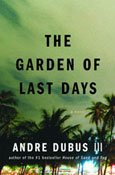Andre Dubus III's "Garden of the Last Days" (W. W. Norton, 2008, $24.95) is a brick of a book. At 500-plus pages, it's America on parade: g-strings and neon, alcohol and testosterone, easy cash, patriotism and dumb sentiment. Once launched, though, a brick sinks quickly. About 50 pages in, the plot staggers under a too-obvious ending. By the time we get there, it reads as overdue and anticlimactic. Though it lacks the subtle poetry of the "House of Sand and Fog," Dubus' newest offering nevertheless manages to be compelling and sympathetic.
The story opens as April, a single parent and the kind of noble stripper only a guilt-ridden male would invent, makes the uncharacteristic decision to bring her daughter to work. When her elderly landlord and regular babysitter lands in a cardiac-care unit, 3-year-old Franny lands at the Puma Club for Men.
Franny is an easy pawn in one of the novel's overriding themes: the examination of purity and absolution in opposing cultures. Her subsequent disappearance from the club and how this will forever alter April's perspective foreshadows the disappearance of America's naiveté following the events of Sept. 11.
While little Franny watches Disney in the office, a client named Bassam watches April in the Champagne Room of the strip club. Later April will tell the cops he was "just a drunken boy," one in a series of other drunken boys. This is only after the 26-year-old Saudi is revealed as a terrorist, elucidating his perverted cocktail of intimacy, desperation and disdain in that single night in the Champagne Room.
The story has a straightforward trajectory, but its purpose is both convoluted and revealed by bumbling, peripheral characters. Beyond the landlord, with her late-life maternal instinct honed on Franny, a child she can't claim, there is April's doppelganger, an illiterate bouncer too sensitive and smart for his life situation, and Bassam's doppelganger, a misguided wife-beater, scheming for others to see him as he sees himself.
"The Garden of Last Days" reads more like a screenplay than a novelmisunderstood characters heading nowhere fast, a swift-packaged ending and general, overt reflection. It's analytical, but just. No surprise that Warner Brothers holds the rights and a rumored 2011 release date.
Dubus' tale spirals around Edenic iconography. There is the real garden, lush and lovely, tended by landlord Jean, where Franny plays and April sips morning coffee. There is the campy fleshpot-paradise of Puma, with its disturbingly mortal populous. Then there is Puma's counterpart, the ethereal paradise of virgins that awaits Bassam and his post-jihad compatriots in Jannah. Finally, there's the idealistic America, the "fall" of Sept. 11 and the nation's mythic loss of innocence, her gain of wisdomone hopes.
Using traditional narrative device to deliver brazen material, Dubus opens himself to criticism and attack by empathetically portraying a terrorist. But his attempts come across as stifled. Some readers may wish that Dubus had gone further, foraging beyond the accessible "man versus flesh, man's quest for meaning" that we encounter every day in fast-produced television and news. Bassam projects his own self-contempt atop a pre-fostered hatred of his concept of America. What he perceives as weakness, he blames on the cab drivers, waitresses, personal trainers and exotic dancers that compile his American existence. But in the space of 500 pages, isn't a deeper and more original divulgement of Bassam's psyche in order?
"The Garden of Last Days" lacks the endurance of canonical literature, but as a sketch in vanity, paradox and the pathos of cross-cultural humanity, it rises to the occasion. That it manages this in the over-extended context of one of modern history's most referenced catastrophes is testament to Dubus' dexterity as a writer.
The cherry-on-top is not the foregone conclusion, but rather the simple dedication to the late Larry Brown, Mississippi author and Everyman. At once ironic and appropriate, Brown seems far-removed from Sept. 11, but like the characters in "Garden," Brown's gritty, liquor-and-sex creations are seeped in Americana, and at this point, what could be more American than Sept. 11?
This book's true value lies in thematic brilliance more than in its actual text. "Garden" is important in its ambition of first attempt. It matters because it rallies to dissect a particular and daunting tragedy in a literary forum.



Comments
Use the comment form below to begin a discussion about this content.